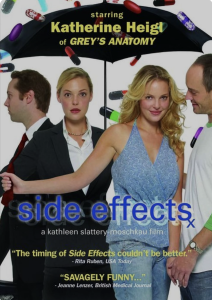Bassem Saab is professor of clinical family medicine and program director, American University of Beirut
Beatrice Khater is assistant professor of family medicine, American University of Beirut
The doctor (Dr) – drug representative (DR) relationship is a complex one. Some argue that it should not exist. In Lebanon, DRs visit doctors in their academic offices, clinic, hospital and even communicate at a social level. Physicians see DRs for several reasons. A common one mentioned by Drs is to stay updated with new medications. This is a weak argument, as the medical literature can provide that in a more balanced way. Some may be attracted to attend continuous medical education sessions or conferences where the speakers are opinion leaders. Usually, these events include banquets that allow Drs to dine and socialize with colleagues. Other Drs are only interested by the samples they receive.1
We use a series of movies used to teach and discuss professionalism with family medicine residents (See our previous article on The Last King of Scotland).2
 Kathleen Slattery-Moschkau wrote and directed Side Effects in 2005. The movie tells the story of Karly who is hired as a DR for a pharmaceutical company. Karley’s background has nothing to do with the medical field. Being honest about effects and side-effects of the promoted medicines increases her sales. The corporation rewards her by increasing her salary, giving her a new BMW car, in addition to other benefits. When she discovers the unethical practices of the drug industry, namely hiding serious side-effects of an antidepressant, she decides to quit.
Kathleen Slattery-Moschkau wrote and directed Side Effects in 2005. The movie tells the story of Karly who is hired as a DR for a pharmaceutical company. Karley’s background has nothing to do with the medical field. Being honest about effects and side-effects of the promoted medicines increases her sales. The corporation rewards her by increasing her salary, giving her a new BMW car, in addition to other benefits. When she discovers the unethical practices of the drug industry, namely hiding serious side-effects of an antidepressant, she decides to quit.
Each of our residents watch this movie alone a week before attending a workshop on Health Professionalism (by videoconference). At the beginning of the workshop, some residents summarise the main points in the movie. After that, the group discusses its impression and thoughts. Themes raised by the residents have included the tactics used by the DR to increase their sales. Of these, they mention hiring of attractive ladies who are generously remunerated. A DR need not have a degree related to pharmacy. Others comment on how DRs may be blinded to serious side effects of drugs, and that DRs’ main interest is making money.
When asked how the DR-Dr relation affects the prescription behaviour of the residents, a majority feel that this does not affect them, but it affects their colleagues. Some studies have shown that accepting gifts and interacting with DR affects physicians’ prescribing behaviour and contributes to irrational prescribing.3 In Lebanon, there are no regulations related to Drs receiving gifts from pharmaceutical companies. Some local companies abuse this situation and offer Drs gifts not related to the medical field.
When asked what they liked least about the movie, our residents focussed on the portrayal of DRs as women, and doctors as unethical and being made fun of. Most of the residents, however, thought that the movie is helpful in teaching professionalism, that the story is realistic, and recommended continuing the activity. All residents agreed that the movie raised good discussion.
References
- Murshid M., Mohaidin Z. A systematic review of the influence of medical representatives and promotional tools on prescribing: A comparison between developed and developing countries. International Journal of Pharmaceutical and Healthcare Marketing 2017; (11): 361-394
- Khater B and Saab B (2022) https://bjgplife.com/the-last-king-of-scotland-using-a-movie-to-explore-family-medicine-residents-understanding-of-professionalism/
- Fickweiler F, Fickweiler W, Urbach EInteractions between physicians and the pharmaceutical industry generally and sales representatives specifically and their association with physicians’ attitudes and prescribing habits: a systematic reviewBMJ Open 2017;7:e016408. doi: 10.1136/bmjopen-2017-016408
Featured image by Denise Jans on Unsplash






